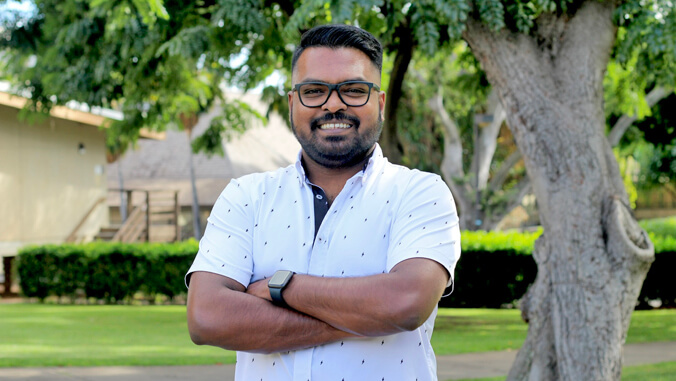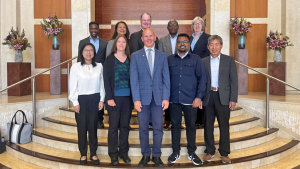
As part of a groundbreaking national initiative to create sustainable refrigerants, a University of Hawaiʻi at Mānoa student is taking the lead on integrating cultural and a broader range of perspectives into climate change solutions.

Allen Vincent, a PhD student in the Department of Chemistry, is the president of the Student Leadership Council (SLC) for ERC EARTH, which stands for Engineering Research Center (ERC) Environmentally Applied Refrigerant Technology Hub (EARTH).
The fourth-generation hub was established by the National Science Foundation (NSF), which recently awarded $26 million to UH and five other universities to launch the project. This is the first time UH Mānoa has been part of a NSF ERC, marking a historic milestone for the university.
ERC EARTH strives to create a transformative “sustainable refrigerant lifecycle” by lowering hydrofluorocarbon emissions; creating safe, property-balanced replacement refrigerants; and increasing the energy efficiency of heating, ventilation, air conditioning and refrigeration systems.
Student-focused collaboration

As president of the SLC, Vincent leads approximately 30 students from UH and the partner institutions who are involved in the project’s research and academic activities. Its goal is to foster student engagement, collaboration in ERC EARTH activities and enhance ERC EARTH’s culture and recruitment of students.
Vincent instilled values of exploration, camaraderie, advancement and competence in the SLC’s activities, reflecting ERC EARTH’s overarching goals. The SLC has already developed frameworks for collaboration and organized student workshops aligning with ERC EARTH’s goals.
“I took the lead to build the SLC up from scratch, to have the SLC and its activities structured around the four pillars of ERC EARTH,” Vincent said. “I am looking forward to helping ERC EARTH reach out to the communities in Hawaiʻi through UH Mānoa and get more students involved.”
In the fifth year of his doctoral program, under the guidance of Professor Rui Sun, Vincent studies gas phase reaction dynamics—how chemical reactions occur between molecules in the atmosphere and interstellar medium, focusing on their reaction mechanisms, thermodynamics and kinetics using quantum chemistry and molecular dynamics simulations. He emphasized how impactful this leadership role has been.
“Over the past two years as the president of the SLC, I have been able to network with PhD students and professors from the other five core universities, which is a unique and amazing experience to have,” Vincent said. “As I aspire to be a professor in the future, apart from the academic skills that I am gaining through research, there is a great deal of people skills that I have been able to pick up from everyone on the ERC EARTH team.”
—By Marc Arakaki

